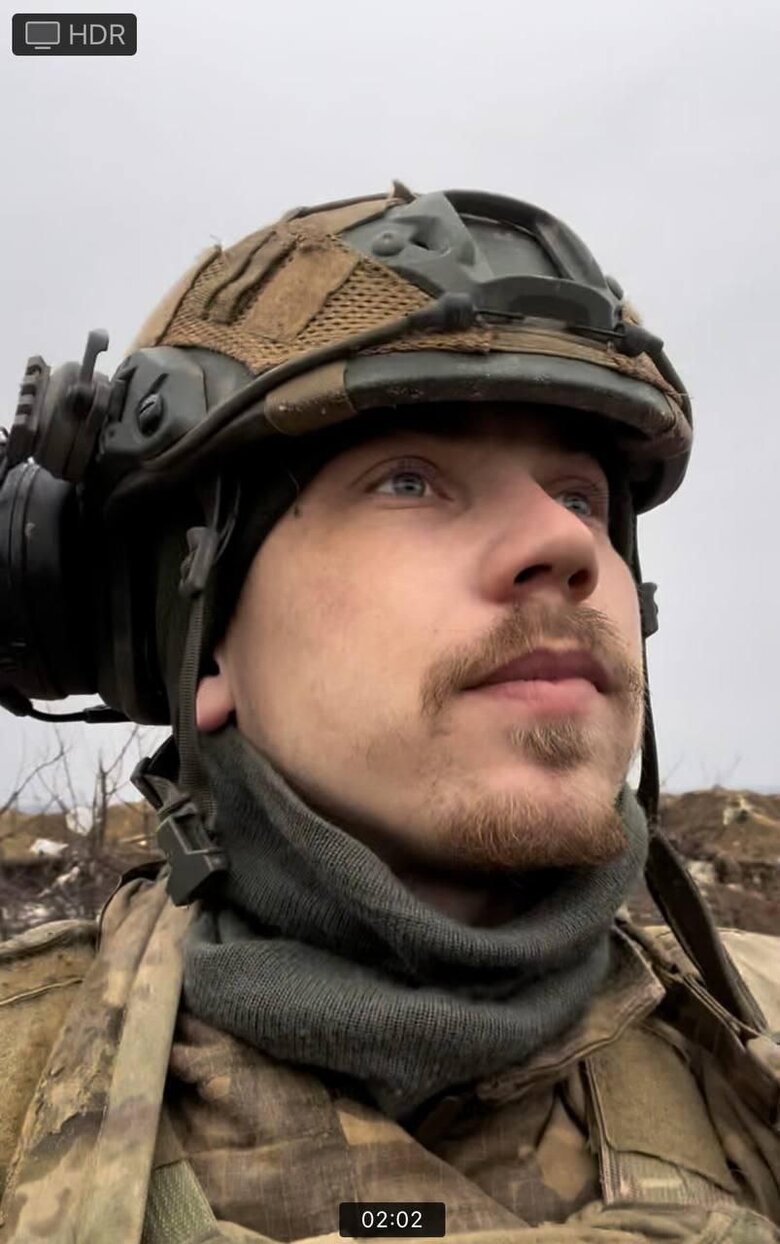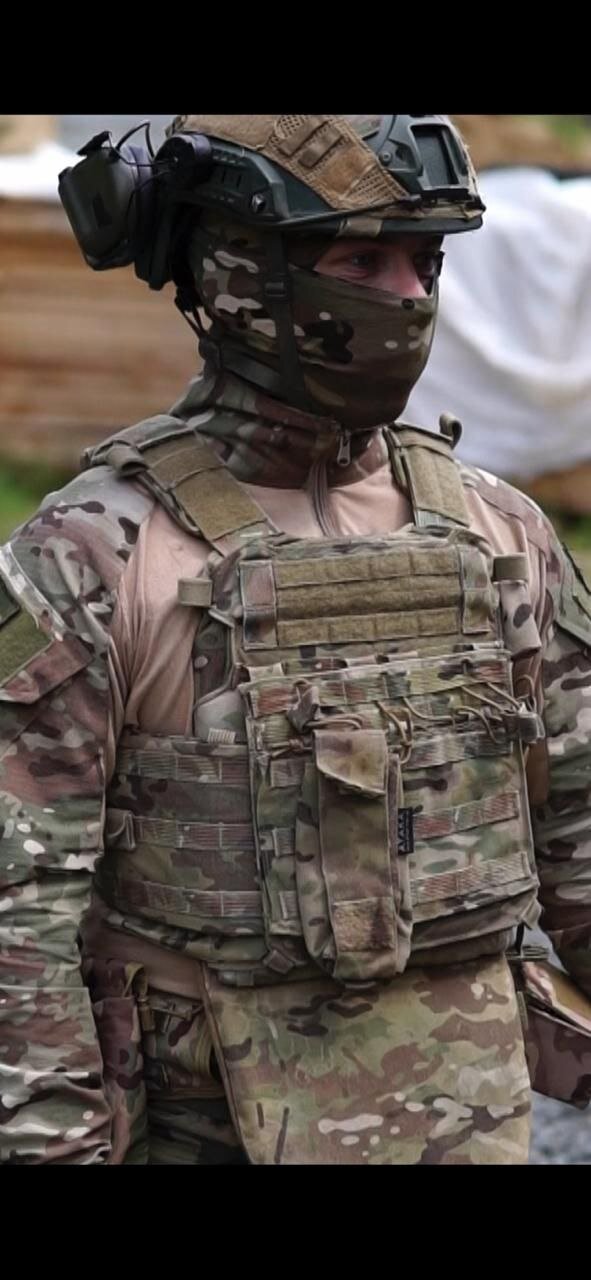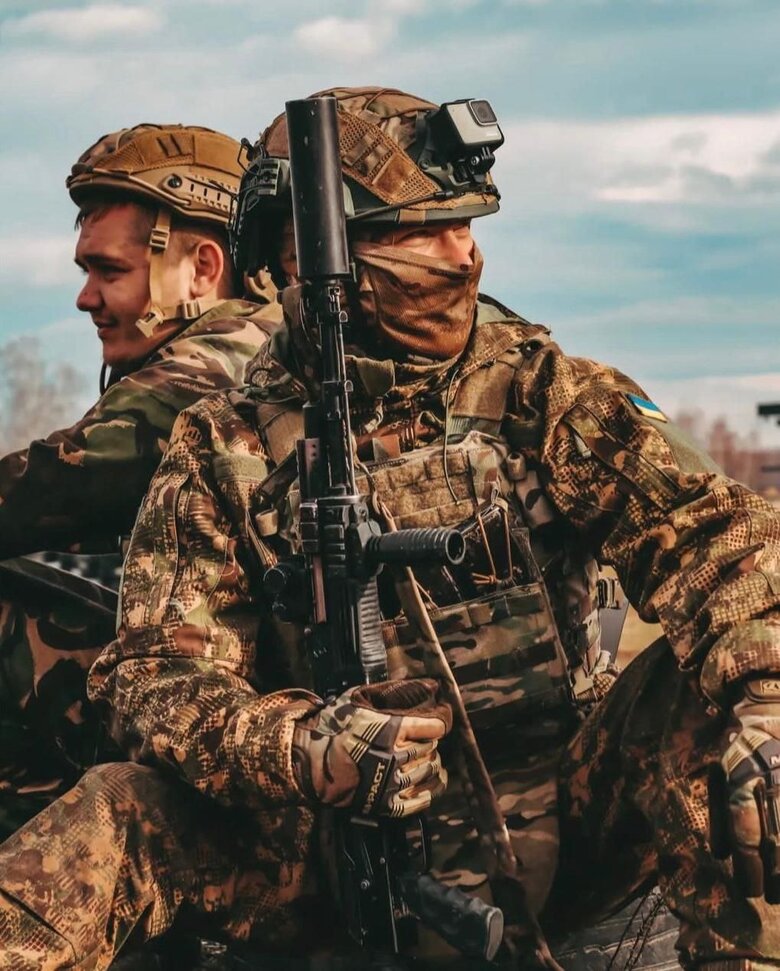UAV pilots are people with golden hands and cat-like reflexes. Enemy EW operates wildly, yet despite that, they deliver good results – soldier Yurii Klymchuk
When several brothers from one family fight to defend Ukraine, it is a double and in this case, a triple sacrifice. Junior Sergeant Yurii Klymchuk from Vinnychyna, who has two biological brothers also serving in the military, began his combat path in 2021 in the 14th Operational Assignment Brigade "Chervona Kalyna" of the National Guard of Ukraine.
He is now 25 years old, and after enduring the hell of infantry combat, wounds, and concussions, he became an aviation UAV sapper.
"I WOULD GO BACK TO THE BATTLES AT THE AZOT PLANT: WE DID NOT RETREAT A SINGLE STEP"
- I was drafted for conscript service in 2021, at the age of 21. Four months later, I signed a contract with military unit 3028. Then came training, and from November 2021 to February 2022, I was deployed to the ATO. On the eve of the full-scale invasion, we were given time off. I had just turned in my weapon, while one group was asked to stay. They didn’t explain the reasons then, but now it’s clear, they were planning to send a company to the Belarus border. That didn’t concern me.
I stayed home for a week or two, but at 6 a.m. on the 24th, my platoon commander called me with an order to arrive at the unit because the war had started. I thought it was just a regular training alert. But on the way, I already heard explosions and saw several planes fly by, and realized this was no joke. At the unit, weapons were immediately issued. Our regiment was defending the Kyiv region.
- Why didn’t you believe war would happen?
- When I was in the ATO, there were talks about it. When I came home, I suggested to my mother to go abroad because things were clearly heading in a bad direction. She refused, as anyone probably would. But there was an internal feeling of impending disaster. As for why I didn’t believe it? It was incredible to imagine such a war starting in the 21st century.
- What motivated you to sign the contract a year before?
- I had planned in advance to sign the contract if I was called up. Patriotism has always been strong within me. When everything started in 2014, I was still young, but I wanted to help. And the best way I could help was on the front line. So back then, I decided that if they took me, I would sign the contract. I even asked about this possibility at the military enlistment office.
- Why the National Guard specifically?
- It wasn’t by chance. At every assignment point, they ask where you want to go. I hadn’t seen any propaganda videos or billboards; it just seemed appealing.
- So let’s continue the conversation about your combat experience. First, the battles for Kyiv and the Kyiv region.
- In the Kyiv region, we successfully held the defense. After the Russians retreated, it felt like we had been stuck there too long. I even asked the platoon commander: the situation in the country is such that everyone is fighting, and here we are. Later, we were indeed sent to Sievierodonetsk, specifically to the village of Syrotyne. On the fourth day, we were told we were assaulting the city. I actually understand the commanders, because they were given a global task as well. We were ordered to clear eight districts and hold our positions. Of course, that sounded like pure fantasy. Even one district is very difficult because during a successful assault, going through every house takes a lot of time.
So we launched the assault and took heavy fire at the very first house. The enemy was very well entrenched; all the houses were like brick walls, every window packed with sandbags. We couldn’t break through. One group got in but retreated because grenades started dropping from the windows. We began to pull back as well when mortars started hitting us.
Then we were sent to hold the defense at the Azot plant. And I really liked how we did it. Defending an industrial zone was an interesting and unique experience. I would go back to those times: we didn’t retreat a single step and gave the enemy a good beating. There were all kinds of foes there — "DPR," "Akhmat," and the regular Russian army. They truly hated us and shouted about it. When the plant was almost encircled, we received an order to withdraw. The river saved us, we left by it at night. We had already pulled back while they were still firing on our positions. In Lysychansk, we rested a bit and then moved on. Later, we covered the withdrawal of our troops from that city.
"WE WERE REPLACED AT THE LAST MOMENT BY 12 SOLDIERS FROM THE ARMED FORCES OF UKRAINE. I FELT TRUE EUPHORIA."
- How did you sustain your first injury?
- We were holding the defense along the river in the village of Serebrianka. When we were rotating shifts, the vehicle was hit and overturned, and I lost consciousness. I still don’t know what exactly happened, whether we ran over a mine or there was an artillery barrage.
After treatment in Kyiv, I returned to duty. I missed a lot of action; later, the guys told me about their exploits. In February 2023, I was already positioned in the Donetsk region, in the village of Spirne. I will never forget the GRP position, which was constantly shelled by enemy artillery and destroyed all our observation posts. I spent four days there. There were up to 18 of us in a small basement. We kept asking our drone operators for any information because we had no idea what was happening outside. At one point, they reported that a tank was already moving near our position.
When we started to rush out, they were pouring fire on us with every weapon they had. We mustered our courage and went in twos and threes. The fight dragged on all day. Unfortunately, two were killed and the other sixteen wounded. Once darkness fell, we holed up in a basement. I asked who was the senior by rank, because decisions had to be made, but no one was responding on the radio. There was a warrant officer among us, yet he refused to take command. I proposed sabotaging the materiel, we couldn’t carry it out and didn’t want to hand it over to the enemy. After that, those who could walk would have to drag those who couldn’t. Just as I raised my hand to start destroying the gear, twelve soldiers from the Armed Forces of Ukraine came in. I felt euphoria; I had never known such relief. They replaced us, and soon our evacuation team arrived. Under artillery cover, we were pulled out.
- You also took part in the counteroffensive in Zaporizhzhia.
- I caught the beginning because from early summer 2023, I was already in Zaporizhzhia. We advanced, pushed the enemy out, then withdrew... I can’t really describe it properly because it felt chaotic; too many people were involved in the operation.
I sustained my third injury at night. The task was to approach the enemy position closely, dig in, and wait for orders. The next day, an artillery barrage began, and I was heavily concussed.
- Why do you describe the situation during the counteroffensive as chaotic?
- I simply didn’t have much information, so it looked chaotic to me. Some people were going on the assault, others were retreating, constant attacks... And I had just returned to the front after three months of treatment.
- How did you end up in the UAV company?
- After treatment, my former platoon commander, who transferred to work with drones, called me and invited me to join him, in the strike UAV company. At first, it was unfamiliar to me, but I was convinced it was effective: one hit on the target, and the enemy is gone. Now, having worked in this team, I can say that UAV pilots are people with golden hands and cat-like reflexes. Enemy electronic warfare operates wildly, cutting off the feed and taking control. But despite that, the pilots work quite well.
My ex-commander helped facilitate my transfer and training. That’s how I became an aviation sapper: I prepare the drone for operation, connect the bomb, and activate the drone itself.
We initially operated in the Zaporizhzhia direction, then were redeployed to the Pokrovsk direction. At the end of 2024, I sustained my fourth injury. I was carrying a drone for launch when I heard the whine of a drone similar to ours, but enemy. I started running to the trench, but the drone crashed nearby, and fragments struck my arm and leg. I rushed into a dugout, which then came under fire. An evacuation team followed us, a bit of a happy ending, actually.
"AKHMAT FIGHTERS SHOUTED THREATS AT US BECAUSE THEY COULD DO NOTHING ELSE"
- Do you remember your first combat contact? How did you overcome fear?
- I’m afraid I might sound crazy now, but everything became much brighter, more colorful, more contrasted. It felt like I saw every leaf falling, every branch, the flight of every bullet. It was as if I were seeing the entire battle as a whole. I don’t remember fear or anxiety; what I definitely felt was excitement.
- You faced Russians quite closely in combat. Aside from the fact that all Russians are unequivocal enemies, what is your opinion of their combat level?
- The "Akhmat" fighters are big, cowardly, bearded guys who just shouted threats at us because they couldn’t do anything else. I don’t know how they’re doing now; maybe they’ve been retrained somehow. Their regular army is like any regular army. The most striking were the "DPR/LPR", just a bunch of monkeys with sticks. I didn’t see any proper actions from their side. Near Spirne, they say Wagner also fought against us, so that was the hardest fight, they really had a coordinated tactic.
- How would you describe your war experience from an emotional perspective? You face things a person normally wouldn’t have to confront…
- During the entire war, I only cried once. I found a friend who saved us from death. During one shelling, a concrete slab fell on us, and I was slightly concussed. He literally grabbed me by the straps of my body armor at the last second and pulled me out. I considered myself indebted to him, but beyond that, I haven’t met anyone as kind. Then, a week later, there was another assault, and this guy was killed. When they told me Kvas was KIA, I really cried for the first time, the ground simply gave way beneath me.
- How do you generally cope with such emotions? At least enough so they don’t interfere with your work.
- When the first casualties happened near me, emotionally my body suppressed the feeling. Later, in hospitals, I realized the depth of the situation. So for me, it’s a delayed effect.
- What are your best memories from the battles?
- As I said before, fighting in the industrial zone at the Azot plant was something special.
It was interesting with the guys on the positions; we talked a lot. Those are pleasant memories, there’s not that much laughter in civilian life: we get attacked, fight back, run across the positions, and joke so much that our stomachs hurt from laughing.
- Is that like a defense mechanism?
- Probably, yes.
- You are a visual arts teacher by profession, and you completed your final year of bachelor’s studies during the war. How did you manage to combine studying and military service?
- They were accommodating. Plus, I have a mentor at the college who guided me organizationally.
- Given this, have you thought about life after the war? What do you plan to do—stay in the military or return to painting
- Honestly, it’s a bit scary when I think about what I’ll do next. I recently tried to paint because before that, there was no time. But I couldn’t, because my hands barely tremble. And I don’t really know how to do anything else except run across a field with a rifle. The college I graduated from has already offered me a job. So it’s too early to think about it now.
- So you don’t plan to demobilize intentionally? I mean the well-known fatigue that inevitably overcomes someone who has been fighting in the military for over three years.
- I do feel tired, no doubt, but there’s no other way. If I am declared unfit (although I seriously doubt that), then I’ll find another way to help.
- What would you say to disheartened, exhausted soldiers? What would you say to those who, for various reasons, go AWOL, especially because of poor leadership?
- I wouldn’t say anything because I can’t judge people. There are different opinions about this. If someone couldn’t endure and went AWOL, or on the contrary, wanted to fight longer on the front line — that’s personal. I can only speak for myself, and right now I’m staying to defend my homeland.
Olha Skorokhod, Censor. NET



